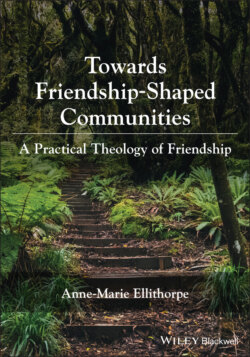Читать книгу Towards Friendship-Shaped Communities: A Practical Theology of Friendship - Anne-Marie Ellithorpe - Страница 16
Part II: A Deep Remembering
ОглавлениеThe normative task, based on Browning’s historical theology sub-movement, involves confronting the scene set in the previous section with the central normative texts of Christianity. The goal is to consider the implications of honest confrontation with normative texts of the faith, including whether theology has understood its ideals appropriately.74 The tasks of interpretation and retrieval of normative texts is not only integral to, but also at the very heart of the hermeneutical process.75 This normative work is not a distanced study of ideas of the past. The past is not disconnected from present events.76 Rather it is the past from which the present emerges and takes its shape.
A note of caution: if interpretive work focuses primarily on understanding contemporary praxis rather than on understanding texts within their historical contexts, then the work fails to respect history as a separate dialogue partner. Biblical and historical texts stripped of their initial context and meanings are “partially silenced.”77 There is a danger of focusing on the way texts are used and understood within current contexts, rather than on the context within which they originated. Consideration of both contexts is important: context matters in relation to both current practice and the interpretation of historical documents. I acknowledge, however, that it is impossible to do justice to all contributing disciplines within this wide-ranging research. It is not possible to provide equally thorough descriptions of current practice and historical-contextual analysis of normative texts.
These chapters consider what a variety of normative texts have to say about friendship and seek to identify the understandings and practices of friendship that these texts encourage. I seek to assist communities to draw upon the richness of ancient texts and traditions, in their responses to contemporary relational needs. Christian practical theology gives special weight to classic Christian texts, while also considering classic texts within inter-related traditions, including the Greek classics “that influenced the Israel of Jesus’ day,” as well as the writings of the Second Testament.78
Listening to texts to which Christianity has itself listened includes attentiveness to the Hebrew scriptures. These scriptures are the focus of Chapter 3. I focus particularly on the possibility of friendship being inherent within the creation accounts, and the role of friendship within the prophetic tradition, within covenantal relationships, and within the wisdom tradition. Chapter 4 turns to Matthean, Lukan, Johannine, and Pauline depictions of friendship and community.79
The philosophers of antiquity influenced early Christian writings and practices and continue to inform conversations regarding friendship. Within Chapter 5 I intertwine the insights of the classical philosophers, particularly Aristotle and Cicero, with themes emerging from the lives and writings of four conversation partners within subsequent Christian traditions, focusing on the essentialness of friendship, characteristics and practices of friendship, the question of friendship with the divine, and the relevance of friendship to communities.
A transitional bridging chapter notes pivotal shifts in vision in the Western world that took place in the late medieval and early modern period, their negative impact on personal and civic expressions of friendship in and beyond that world, and the potential for a cosmic vision of friendship to reveal the broader reality in which we are immersed.
